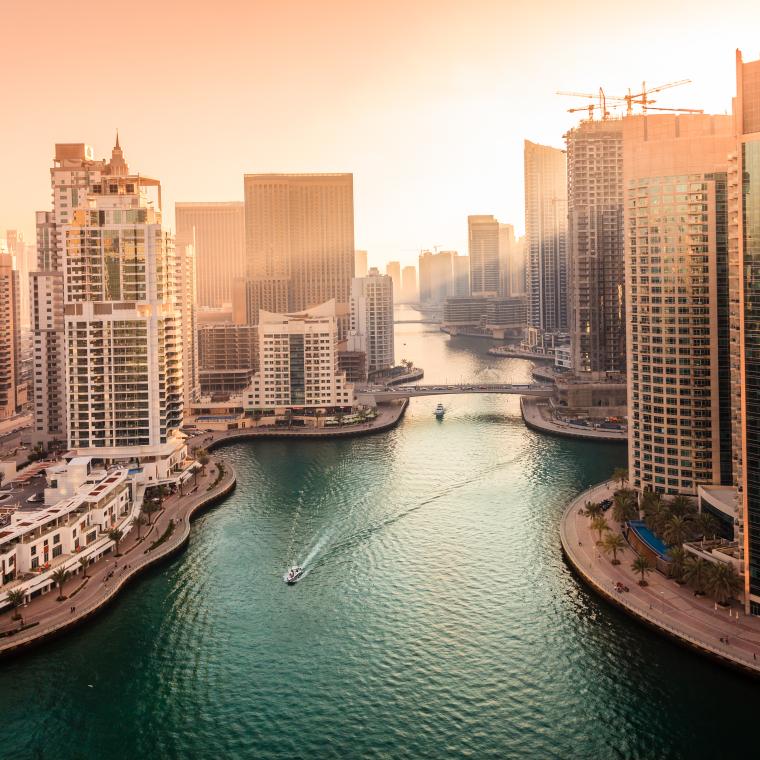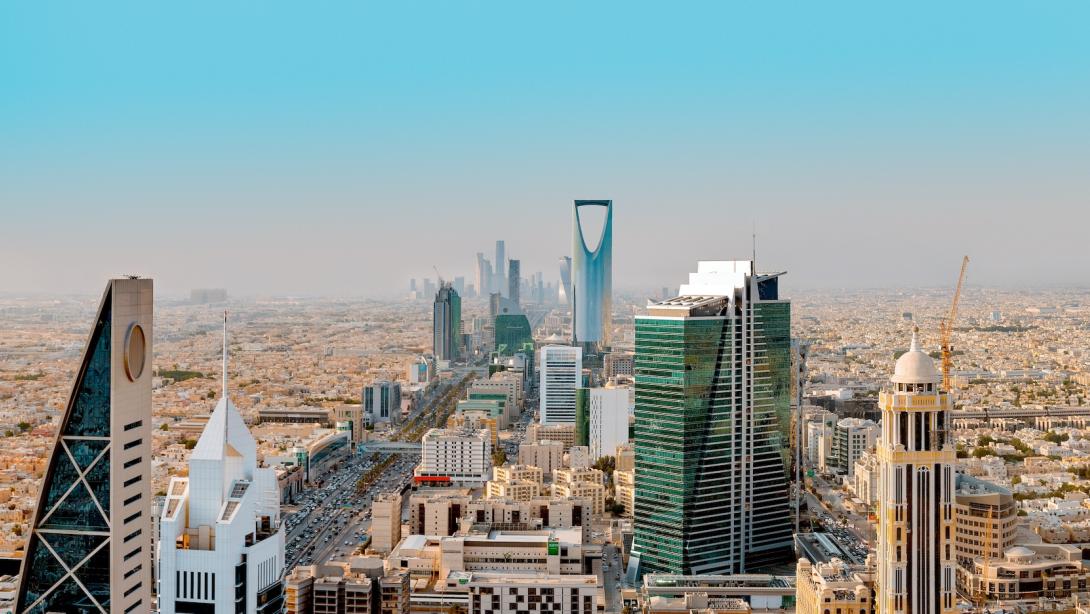
The Middle East has a new role on the global funds stage. Whereas once it primarily played the part of fundraising destination, it has more recently stepped into the limelight as a versatile long-term strategic capital partner for fund managers around the world. As part of our series exploring how North American fund managers are evolving their strategies, Charlie Rix and Veena Karuthasen of Ocorian explain how the Middle East has flipped the script and become a key player in enabling cross-border capital flow, diversifying global funds and broadening the views of its traditional client base.
A foundation of fundraising
The Middle East has long been a location for fundraising and finding the capital needed to bolster funds around the world. But there is an increased focus on the region thanks to a combination of geopolitical moves and intention on the part of Gulf states, promoters and regulators.
The establishment of the DIFC and the ADGM in the last 20 years, and Saudi Arabia’s Vision 2030 getting ever closer to fruition, show that international finance centres have been created as part of a deliberate strategy, not as an opportunistic gambit.
A consequence of this positioning is increased outward capital flows, something that is being anticipated by 95% of respondents to our North America fund manager survey, who said they expect to see an increase in the percentage of capital they raise from the Middle East over the next five years.
But it’s not just existing amounts that are set to increase. A focus on appealing to fund and asset managers across the world is also seeing the introduction of new firms, funds and people to the region.
When asked if they expect to see capital commitments from new geographies, 57% of respondents to our survey said yes and named the Middle East as the likely source; it was the single most popular region from the responses.
Facilitating capital flows is part of the overall policy and strategic direction. Many of the sovereign wealth funds in the region are not only putting this demand on the funds industry but are backing it up with substantial investments of their own. Sovereign wealth funds manage around $4tn in assets across the region and increasingly are looking to deploy capital not just internationally, but also domestically.
Attracting capital to the region
The Middle East has undoubtedly stepped into the global limelight in recent years. The leaders of many of its nations have crafted careful and deliberate economic growth strategies that enable their countries, and the region as a whole, to have a role on the world stage and be seen as modern cultural and economic powerhouses that can not only compete with the rest but also establish their own identities and niches.
This is as true in financial services as it is in hosting football World Cups; both have a shared intention of bringing the very best to the Gulf. The region is home to a growing financial services talent pool, as practitioners are choosing to relocate their families and lives to the UAE; the lifestyle on offer and a growing number of international schools and professional opportunities all contribute to the appeal.
For the funds industry, this has resulted in a pivot from being a hotbed of fundraising for predominantly European and North American fund managers, to a hub for originating, structuring and executing capital flows across borders.
The changing geopolitical situation has aligned with the Gulf’s own marketing and increasingly outward-facing focus. With a new US administration placing economic growth being high on its agenda, the Middle East was positioned as a sensible strategic partner early on.
One of his first international visits was to the US’s allies in the region, where shared economic aims were discussed and promoted. US firms have taken the baton and run with it, recognising that they can strengthen their investors, assets and fundraising by tapping into the market, but domestic firms in the Middle East are rapidly turning this into a two-way street.
In order to attract capital to the region, the sovereign wealth funds are starting to back local firms, or firms with a strong presence in the DIFC, ADGM and other GCC countries, with investments.
In a region where relationships are hugely important, the sovereign wealth funds are playing a key role in forging a pathway for domestic capital deployment allied to foreign capital fundraising. It’s not uncommon to have funds with multiple sovereign wealth funds invested in them; a virtuous cycle of introductions that benefits the region enormously but also sends a signal to external investors.
A further boon to the local industry is the growing popularity of master-feeder structures.
This involves combining master funds in the traditional fund strongholds like the Cayman Islands, Guernsey and Jersey with feeder fund structures in the UAE or other GCC countries. The benefits run both ways: fund managers can get into the Gulf market to access local investors, including the sovereign wealth funds, and the region benefits by having established players set up funds of real substance on the ground, improving the reputation, capability and ability to deploy capital locally.
Evolving into a strategic partner
It is to the credit of IFCs like the DIFC and ADGM that they have been successful in building a mature, multi-faceted financial services industry so quickly, but they’ve crucially married this with sustainable development so that it’s not a flash in the pan.
The Middle East now offers much more to the global fund manager than ever before, and Ocorian’s own journey is symbolic of how providers have invested into the region, set up significant offices with experts on the ground, and have made the Gulf a key part of global capital flows for clients who increasingly want a comprehensive worldwide service.
The supporting ecosystem is a further pull factor. Crucially, domestic funds have a whole range of assets to invest in.
Infrastructure and real estate funds have always been popular with domestic investors for their low-risk, long-term benefits, and that does remain the case. But a new generation of asset managers is taking advantage of opportunities in digital assets and technology especially, both of which have been identified as huge growth areas for the Middle East and have the backing of ambitious state policies across the GCC.
There is certainly an appeal to being able to invest in an alternative asset class that has solid backing, exciting possibilities and, crucially, a perceived level playing field with the rest of the world. Because much of this technology is so new investors can see that the Middle East is not playing catch up, it’s leading the way, and that provides its own appeal to domestic and international funds.
Growth backed by the regulators
None of this growth would be possible without the backing of the region’s regulators, who have worked hard to collaborate with industry, enable growth and meet international standards.
It’s a delicate balancing act, but our experience of working with the regulators in the UAE is that they are extremely helpful; they meet us regularly to understand what our clients are asking us for, how they can adapt to the complex requirements of an international client base, and how the region can improve. That level of openness and honesty is hugely important to growth.
The regulators here in the Middle East also have a refreshing attitude to growth itself. They recognise that they are there to enforce international standards of compliance – essential for recognition on the world stage – but also have a commercial mindset and progressive outlook to support firms with practical business challenges.
Unlike globally where typically one regulator governs a jurisdiction, the UAE is a multi-regulator state. This enables a helpful ecosystem for end-to-end providers like Ocorian, where our regulatory expertise is as valued by our clients as our comprehensive services for asset managers.
Experience of the region is vital
The Middle East funds industry is growing all the time and is presenting an increasing array of options to international asset managers who have ever-more complex requirements. As the Gulf becomes more global, it’s essential to work with a provider who has experience in the region, a relationship with the regulator, and can offer a comprehensive service.
Ocorian has been partnering with asset managers and asset owners for over 50 years, helping them to run their structures compliantly and efficiently. We support every stage of the fund lifecycle ensuring seamless, expert-driven, technology-led service.
Whether partnering with a first-time manager or a manager with decades of success at an established fund, we work with our clients from the beginning to set up the entire foundation for the life of the fund. We work as an extension of your team, using leading technology to configure and maintain best in class accounting, reporting, and administration. We know how to deploy and scale seasoned executives with a track record of buy-side success, providing greater efficiency, agility, and targeted experience by role.
Ocorian’s multidisciplinary team delivers cross-border services for asset managers, portfolio companies, and high-net-worth families & individuals globally. Contact our team today.
[1] https://www.ashurst.com/en/insights/sovereign-wealth-funds-in-the-middle-east/
